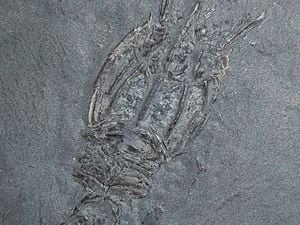Ancient shrimp named ‘weegie’ in honour of Glasgow origins
The shrimp is believed to have swam in the Carboniferous seas surrounding Glasgow around 333 million years ago.

A type of shrimp that died out hundreds of millions of years ago has been declared a new species and a Glaswegian.
The shrimp is believed to have swam in the Carboniferous seas surrounding Glasgow around 333 million years ago.
Its fossil was found at the same world-famous locality where the Bearsden Shark was excavated in the early 1980s.
The shrimp has been given the name Tealliocaris weegie after a scientific paper identified it as a Glaswegian crustacean.
Its authors thought that it would be appropriate to name the new species in honour of the people of Glasgow and the local dialect.
Dr Neil Clark, curator of palaeontology at The Hunterian and one of the paper’s authors, said: “It is quite rare that any fossil is recognised as a new species and particularly the fossilised remains of a shrimp.
“I am especially proud, as a Glaswegian myself, that we were able to name a fossil shrimp Tealliocaris weegie.
Dr Andrew Ross, principal curator of palaeobiology at National Museums Scotland and the second author of the paper, said: “This new species of crustacean, along with others collected recently from the Scottish Borders, now in the collections of National Museums Scotland, add to our knowledge of life at the beginning of the Carboniferous, 350-330 million years ago, when back-boned animals were starting to colonise the land.”
Professor Rob Ellam FRSE, emeritus professor at the University of Glasgow and editor of the Earth and Environmental Science Transactions journal, said: “This new species of fossil crustacean is basically a tiny fossil version of what we eat as scampi today.
“This paper goes to show that there is still great science to be done with fossils that can be discovered on our own doorstep.
“Moreover, naming one of the new species T. weegie shows that there is still room in the serious world of professional palaeontology and scientific publishing for a welcome bit of light-hearted Glaswegian banter.”





